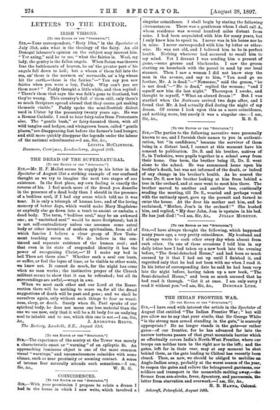THE DREAD OF THE SUPERNATI7RAL.
[To THE EDITOR OF THE " SPECTATOR."] SIR,—Mr. H. F. Mallet seems to supply in his letter in the Spectator of August 21st a striking example of our confused thought as we try to imagine the next two stages of our existence. In the first place, my own feeling is exactly the reverse of his. I feel much more of the dread you describe in the presence of a dead body than I should in the presence of a bodiless soul, if I had any sense which told me it was near. It is only a triumph of human love, and of the loving memory of better days, which would make Mary Magdalene or anybody else go down into a tomb to anoint or embalm a dead body. The term, "bodiless soul." may be an awkward one ; an "unclothed soul" would be more Scriptural; but it is not self-contradictory unless one assumes some astral body or other invention of modern spiritualism, from all of which fancies I believe a clear grasp of New Testa- ment teaching saves us. We do believe in the con- tinued and separate existence of the human soul ; and that even in its state of suspended identity it has the power of recognising Christ,—" If I make my bed in hell Thou art there also." Whether such a soul can learn, or suffer, or feel the lapse of time, or be visible to other souls, we know not. It cannot do much, for the night has come when no man works ; the instinctive prayer of the Church militant seems to show that it can be refreshed; but all its surroundings are awful,—wrapt in awe.
When we meet each other and our Lord at the Resur- rection there will be nothing to scare us, for all the dread suggestions of death will be past and gone ; and we shall be ourselves again, only without such things to fear as weari- ness, sleep, or death. Surely when St. Paul speaks of our spiritual body, he does not mean one less material than the one we use now, only that it will be a, fit body for an undying soul to inhabit and to use, which this one is not.—I am, Sir, J. ANDREWES REEVE. The Rectory, Lambeth, S.E., August 21st.
[To THE EDITOR OF THE "SPECTATOR."] SIR,—The experience of the sentry at the Tower was merely a characteristic onset or "warning" of an epileptic fit. An approaching luminous object is one of the most common visual "warnings," and unconsciousness coincides with some climax, such as near proximity or seeming contact. A sense of intense fear naturally attends such sensations.—I am,
Sir, &c., W. R. G.


































 Previous page
Previous page